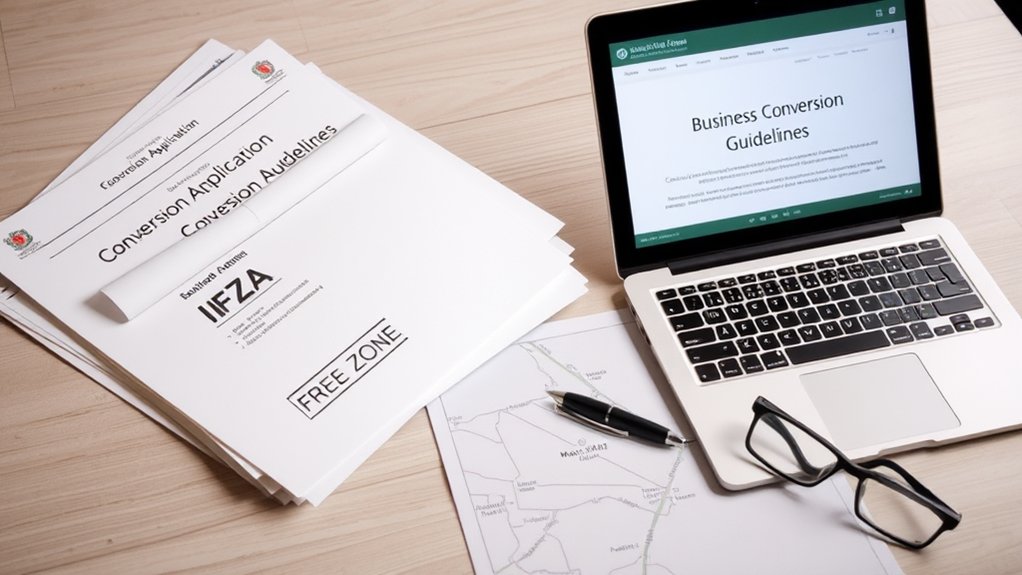Yes, you can convert an IFZA Free Zone company into a Mainland business. To do this, you'll need to follow specific regulatory procedures. First, obtain a No Objection Certificate from the Free Zone authority. Then, you must choose a legal structure and secure a physical office space of at least 200 square feet. You'll also need to register a unique trade name and submit the necessary documentation to the Department of Economic Development. This process allows you greater access to local markets and the ability to sponsor employee visas. You'll find more details on ensuring a smooth changeover and compliance with local laws.
Overview of IFZA Free Zone

If you're considering starting a business in Dubai, the International Free Zone Authority (IFZA) is a standout option. This Free Zone offers a simple and efficient process for company registration. One major advantage of IFZA is that it allows 100% foreign ownership. This means you don't need a local partner or sponsor to operate your company.
Companies registered under IFZA enjoy significant financial benefits. For instance, they benefit from zero corporate tax and no import or export duties. These advantages can greatly enhance your profitability and make it easier for you to grow your business. The IFZA supports a wide range of business activities, including trading, consultancy, and various services. This flexibility allows you to choose the business model that suits your goals with minimal restrictions.
Another appealing feature of IFZA is its office solutions. Whether you need a physical office space or a virtual office, IFZA has options that cater to different business needs. This flexibility helps you set up your operations in a way that aligns with your requirements. Additionally, IFZA provides a comprehensive range of business licenses that cater to various sectors and business models, ensuring compliance with local regulations.
Benefits of Mainland Business
Shifting your business from an IFZA Free Zone to a Mainland company opens up a world of opportunities. One of the main benefits of mainland business is the increased operational flexibility. You can access local markets and government contracts without the restrictions that come with Free Zones. This freedom allows you to expand your reach and grow your business more effectively.
Another advantage is the ability to sponsor employee visas. This means you can attract and retain global talent, enhancing workforce diversity. A diverse team can bring fresh perspectives and innovative ideas to your business.
When it comes to costs, operating on the Mainland often results in lower rental expenses for office space compared to Free Zone locations. This can greatly reduce your overall operating costs, freeing up resources for other important areas.
Additionally, mainland businesses enjoy lower corporate taxes and no import/export duties. These financial benefits can greatly improve your profit margins, leading to better financial sustainability in the long run. Furthermore, as a Mainland company, you are not limited by visa quotas, which allows for greater flexibility in workforce management.
Lastly, as a Mainland company, you can participate in government tenders. This opens doors to lucrative contracts that aren't available to Free Zone companies. By taking advantage of these opportunities, you can drive considerable business growth.
Key Considerations for Conversion

What do you need to contemplate when converting your IFZA Free Zone company to a Mainland business? First, think about the conversion process itself. You'll need to guarantee your business activities align with what's allowed in the Mainland. Some activities permitted in the Free Zone may not be available in the Mainland, so verify these details early on.
Next, consider the requirement for a local service agent. This is vital for certain business structures, particularly if you operate a Civil Work Company. Having a local service agent can help streamline the shift and guarantee compliance with local regulations.
You'll also have to obtain a new business license from the Department of Economic Development (DED). This step is fundamental in the conversion process and requires you to submit the necessary documents and fees. Be prepared for costs associated with licensing and any potential office space expenses.
Speaking of office space, you'll need to meet the local office space requirements set by the DED. Having a physical location is not just about compliance; it also impacts your ability to operate effectively in the Mainland market.
Lastly, keep in mind that conversion might involve changes in operational compliance requirements. Understanding these factors can help you prepare for a smoother shift. By considering these key aspects, you'll be better equipped to convert your IFZA Free Zone company into a successful Mainland business. Additionally, it is important to be aware of the annual license renewal fees that typically mirror initial trade license costs.
Regulatory Procedures for Transition
When you're ready to convert your IFZA Free Zone company to a Mainland business, you'll need to understand the regulatory procedures involved. This includes knowing the eligibility criteria, gathering the required documents, and following the specific steps for conversion. Each part of the process is essential to guarantee you meet all local regulations and successfully shift your business. Additionally, it is important to consider the mandatory local sponsor requirement for LLCs outside free zones during this transition.
Eligibility Criteria Overview
To successfully shift your IFZA Free Zone company to a Mainland business, you'll need to meet specific eligibility criteria and adhere to regulatory procedures set by the Department of Economic Development (DED) in Dubai. First, verify that your business activity is permissible on the Mainland and complies with local market regulations. This is an important step in the changeover process.
Next, the shareholders of your Free Zone company may need to meet certain qualifications. For instance, possessing professional training certifications could be mandatory for the new Mainland setup. Additionally, you must secure a physical office space of at least 200 sq. ft., as virtual office options are not allowed for Mainland registrations.
Finally, as part of the changeover, you'll need to submit necessary documentation. This includes preparing a new Memorandum of Association and obtaining a new business license from the DED. Moreover, maintaining ongoing legal compliance with local regulations is critical for your business's sustainability. Meeting these eligibility criteria is vital for a smooth changeover from an IFZA Free Zone company to a Mainland business, allowing you to operate within the broader market framework of Dubai.
Required Documentation Process
Converting your IFZA Free Zone company to a Mainland business requires several key documents to guarantee a smooth changeover. First, you must obtain a No Objection Certificate (NOC) from the Free Zone authority, which initiates the shift process. This document confirms that the Free Zone authority has no objections to your conversion.
Next, gather your original trade license, memorandum of association, and a copy of the company's share certificates. These documents are essential for the licensing application. You'll also need a detailed business plan outlining the intended activities and operations of your Mainland entity.
Additionally, securing a tenancy contract for a physical office space is critical. This space must comply with local regulations to meet the requirements for registration. The office space demonstrates that you have a legitimate business location in the Mainland.
Once you've compiled all the necessary documentation, submit your licensing application to the Department of Economic Development (DED) for approval. This step is fundamental to complete the shift successfully and operate as a Mainland business.
Steps for Conversion
Initiate the conversion process by securing a No Objection Certificate (NOC) from the Free Zone authority. This document confirms your intention to transfer your business to the Mainland. After obtaining the NOC, you need to select an appropriate legal structure for your Mainland operation, such as a Limited Liability Company (LLC) or Sole Proprietorship. This choice will influence your licensing requirements.
Next, register a unique trade name with the Department of Economic Development (DED). This step is vital as the trade name represents your business identity in the Mainland. Once your trade name is approved, gather the necessary documents, which include the Memorandum of Association and relevant identification. These documents must be submitted along with your licensing application to the DED.
After your licensing application is approved, secure a physical office space in the Mainland, ensuring it complies with local regulations. This office is essential for finalizing the conversion. By following these steps and adhering to the regulatory procedures, you can successfully convert your IFZA Free Zone company into a Mainland business.
Required Documentation for Conversion

When you're ready to convert your IFZA Free Zone company into a Mainland business, you'll need to gather several key documents. First, you must update the Memorandum of Association (MOA) to reflect your new business structure and activities. This is vital as it defines the scope of your operations in the Mainland.
Next, you'll need a valid tenancy contract for your new office space in the Mainland. This is important to comply with local regulations during the conversion process. Without this, your application might face delays or rejections.
Additionally, make certain to provide passport copies of all shareholders, along with Emirates IDs if applicable. You may also need to submit any necessary professional qualifications to meet the licensing requirements for Mainland businesses.
Approval from the Dubai Economic Development (DED) is a must. For this, you'll need to submit a new licensing application that includes the updated business activity details. This application will be reviewed to confirm it aligns with the regulations for a Mainland business.
Finally, be prepared to submit any additional documents that may be required for your specific business activity and legal structure. This might include permits or certificates relevant to your trade. Having all this required documentation ready will help guarantee a smooth shift from an IFZA Free Zone company to a Mainland business, allowing you to operate effectively and legally in the region.
Business Activity Verification
Before you convert your IFZA Free Zone company to a Mainland business, you'll need to check if your business activities are allowed under Mainland regulations. This means evaluating the licensing requirements and making sure you're in compliance with local laws. Consulting with experts can help you navigate these considerations smoothly.
Activity Compatibility Check
To guarantee a smooth shift from an IFZA Free Zone company to a mainland business, you'll need to verify that your proposed business activities comply with Dubai Economic Development (DED) regulations. Before making the shift, it's essential to conduct an activity compatibility check. This confirms that the activities you plan to pursue are permitted under the DED guidelines for mainland operations.
Certain business activities that are allowed in Free Zones may not be available on the Mainland. This makes it important to confirm that your existing activities align with those permitted for mainland companies. The type of business activities you choose will dictate the license required for your Mainland Company Setup, so careful selection is critical.
A detailed review of the DED's business activity list can help you identify any restrictions or additional requirements. Consulting with a business setup expert can greatly facilitate this process. They can provide insights into applicable regulations and assist with any necessary documentation. By taking these steps, you'll position your business for a successful conversion to mainland status, confirming compliance with local regulations.
Licensing Requirements Assessment
Once you've confirmed that your business activities are compatible with DED regulations, the next step is evaluating the licensing requirements for your mainland business. You'll need to follow specific steps to guarantee compliance with the Department of Economic Development (DED). Here's what you need to take into account:
- Legal Structure: Decide on a legal structure for your mainland company, such as LLC or Sole Proprietorship.
- Trade Name Registration: Choose a unique trade name that complies with local regulations and register it with the DED.
- Licensing Application: Submit a licensing application detailing your business activities and visa requirements. This will also require documents like the Memorandum of Association.
- Office Space Requirements: Verify you have a physical office of at least 200 sq. ft., as this is mandatory for your business registration and licensing.
Regulatory Compliance Considerations
As you prepare to convert your IFZA Free Zone company to a Mainland business, it is crucial to verify that your planned activities align with the regulations set by the Dubai Economic Development (DED) authority. Not all business activities allowed in Free Zones are permitted on the Mainland, so you need to guarantee compliance with local laws.
To begin, conduct a detailed assessment of your company's current operational scope. This assessment helps align your activities with the Mainland's regulatory framework and licensing requirements. You'll need to re-evaluate documentation such as the Memorandum of Association and trade name approvals. These documents must be updated and submitted as part of your new Mainland license application.
Engaging a business setup consultant can be very beneficial during this process. They can guide you through the complexities of regulatory compliance and help you navigate the necessary steps for a smooth shift from Free Zone to Mainland status. Their expertise can save you time and guarantee that you meet all requirements effectively. By taking these steps, you can facilitate a successful conversion and position your business for future growth on the Mainland.
Choosing the Right Legal Structure

Choosing the right legal structure is essential when shifting from an IFZA Free Zone company to a mainland business, as it greatly affects your operations and compliance. You need to assess several options based on your business activities and ownership requirements. Here are four key factors to contemplate:
- Limited Liability Company (LLC): An LLC allows for up to 100% foreign ownership if you appoint a local service agent. This structure offers flexibility in operations and compliance.
- Sole Proprietorship: This is a simpler structure but limits your ability to expand and may not allow for full foreign ownership. It's important to evaluate if this fits your long-term goals.
- Civil Company: Suitable for professionals, a Civil Company requires partners to be UAE nationals. This structure can be effective but limits ownership options.
- Business Activities: Verify that your planned activities are permissible under the selected legal structure. Some activities may be restricted or exclusive to Free Zones, affecting your licensing type.
Ultimately, your choice of legal structure impacts much more than just compliance. It determines your operational flexibility, the ability to sponsor employee visas, and access to local markets. You'll also need to confirm that your Memorandum of Association aligns with the new legal structure and meets Department of Economic Development regulations. Make your choice wisely, as it lays the foundation for your business's success in the mainland.
Steps to Registering a Mainland Company
To successfully register a mainland company after converting from an IFZA Free Zone entity, you'll need to follow a series of clear steps. First, select a business activity that aligns with local regulations. This choice will dictate the type of license you'll need. It's vital to guarantee that your selected activity complies with the local laws to avoid any complications.
Next, determine the legal structure of your company. You might choose between options like a Limited Liability Company (LLC) or a Sole Proprietorship. Your choice impacts how your business operates and what liabilities you may face. Once you've settled on the structure, you'll need to register a unique trade name with the Department of Economic Development (DED). Make sure the name adheres to local naming regulations to prevent any issues down the line.
Now, gather the required documents for registration. You'll need the Memorandum of Association, passport copies of all shareholders, and a valid tenancy contract for your business location. These documents are essential for the registration process.
Lastly, submit a licensing application to the DED. This application should detail your chosen business activity and include any visa requirements for your operations. Following these steps carefully will help you shift smoothly from an IFZA Free Zone company to a registered mainland business, setting you up for success in the local market.
Office Space Requirements

When converting your IFZA Free Zone company to a Mainland business, you need to secure a physical office space of at least 200 square feet. This space must comply with local regulations, including having a valid tenancy contract. Remember, the location of your office can affect your business's operational scope and visa quotas, so choose wisely.
Physical Office Space
Securing a physical office space is essential for moving your IFZA Free Zone company to a Mainland business. This step is necessary not only to comply with local regulations but also to apply for a Mainland business license. You'll need to meet specific requirements to guarantee a smooth shift. Here are key points to take into account:
- Size Requirements: You must have at least 200 sq. ft. of office space per employee.
- Tenancy Contract: The office must be secured through a valid tenancy contract to support your application.
- Dedicated Location: Unlike Free Zone companies, Mainland businesses require a dedicated business location, not a virtual office.
- Employee Visas: Establishing a physical office is vital for obtaining employee visas, as the number of visas is based on your office size.
Compliance With Local Regulations
As you shift your IFZA Free Zone company to a Mainland business, complying with local regulations regarding office space is essential. You'll need to secure a physical office space of at least 200 sq. ft. This space must adhere to local zoning laws specific to your business activity.
Here's what you need to keep in mind:
| Requirement | Description |
|---|---|
| Office Space Size | Minimum of 200 sq. ft. |
| Tenancy Contract | Valid contract required for DED |
| Office Equipment | Must meet operational needs |
Compliance with local regulations is critical during your changeover. You'll need to submit updated documents, including the tenancy contract, to the Department of Economic Development (DED) for mainland registration. Additionally, the office space must support employee visa quotas based on its size.
Visa Eligibility for Employees
Employees of an IFZA Free Zone company can obtain UAE residence visas once the company secures the necessary licenses and office space. The visa eligibility for employees is straightforward, but there are specific requirements to bear in mind. A Free Zone company can sponsor employee visas based on the allocated office space, with a minimum of 200 sq. ft. required per employee.
Here are some key points to reflect upon regarding visa eligibility for employees:
- Sponsorship: The IFZA Free Zone company must sponsor the employee's visa, which is contingent upon having the appropriate licenses and office setup.
- Visa Types: Employees will receive residence visas that are valid for up to three years, allowing them to live and work in the UAE.
- Shifting to Mainland: If the business shifts to a Mainland company, employees must apply for new visas under the Mainland company's sponsorship.
- Document Requirements: Employee visa applications need several documents, including passport copies, medical fitness certificates, and proof of employment with the new Mainland company.
The processing time for employee visas can vary, but it generally takes 1-2 weeks after you submit all required documents and approvals. Understanding these details will help guarantee a smooth process for obtaining employee visas, whether for an IFZA Free Zone company or a Mainland company.
Transitioning Business Operations

Shifting your IFZA Free Zone company to a Mainland business opens up new opportunities for growth and expansion across the UAE. This change allows you to operate without restrictions and to participate in government contracts and tenders. However, it's vital to understand the conversion process and its requirements.
First, you need to guarantee that your business activities align with those permitted on the Mainland. Some activities that were exclusive to your IFZA Free Zone may not be allowed in the Mainland setting. Next, you must secure a physical office space of at least 200 square feet. This is a key difference from the virtual office options available in Free Zones.
The conversion process involves several steps. You'll need to submit additional documentation, including a new Memorandum of Association. Compliance with local regulations is essential to obtain the necessary licenses for your new Mainland business.
During this change, it's important to carefully plan your operational strategy. Review your current business activities and determine which ones can be adapted to fit the Mainland business model. This may involve modifying your services or rethinking your target market.
Understanding Tax Implications
When you convert your IFZA Free Zone company to a mainland business, you'll face new corporate tax requirements. Unlike the 0% tax rate in Free Zones, mainland companies may pay a 9% corporate tax if they exceed a certain income threshold. Additionally, you'll need to take into account the differences in export and import duties, which can influence your overall tax burden.
Corporate Tax Requirements
As businesses navigate the complexities of converting from an IFZA Free Zone company to a Mainland operation, understanding the corporate tax requirements becomes vital. Here are key points to reflect on:
- Corporate Tax Rate: The UAE has introduced a standard corporate tax rate of 9% for businesses exceeding a specific income threshold.
- Tax Regulations: Companies in Free Zones, including IFZA, may face different tax regulations compared to those operating in the Mainland.
- Compliance Requirements: To comply with the new tax framework, businesses need to maintain accurate accounting records and submit annual tax returns.
- Potential Benefits: Shifting to Mainland may open up eligibility for government grants and training programs that aren't available in Free Zones.
Understanding these corporate tax implications is significant for effective financial planning. It's wise to consult with tax and legal experts to navigate this change. They can provide guidance on compliance and help you avoid penalties. As you reflect on this conversion, evaluating the tax landscape can be a vital step in ensuring your business remains profitable and compliant.
Export/Import Duty Differences
Maneuvering the differences in export and import duties is a key aspect of converting your IFZA Free Zone company to a Mainland business. Free Zone companies enjoy the advantage of zero import/export duties, making trading within their designated areas quite cost-effective. However, once you shift to a Mainland business, you'll face different rules. Mainland businesses are subject to import/export duties that can vary based on the type of goods you trade.
This conversion means you might incur additional costs linked to customs duties when importing goods. It's important to understand that while Mainland companies benefit from potentially lower corporate tax rates, Free Zone companies enjoy tax exemptions. These differences create varied financial implications depending on your business structure.
To make informed decisions, you need to grasp the specific duties and tax regulations relevant to both Free Zone and Mainland operations. This understanding is vital for strategic financial planning and operational efficiency. By recognizing how import/export duties will affect your bottom line, you can better prepare for the changes that come with the conversion.
Differences Between Free Zone and Mainland

Understanding the differences between Free Zone and Mainland businesses is essential for anyone looking to establish a company in the UAE. Each option has unique characteristics that can affect your business setup in Dubai. Here are some key differences to reflect on:
- Ownership: Free Zone companies allow 100% foreign ownership, while Mainland businesses may require a local service agent to achieve full ownership in certain cases.
- Operating Scope: Mainland companies can operate anywhere in the UAE without restrictions. In contrast, Free Zone companies are limited to their specific jurisdictions.
- Office Requirements: Free Zone setups often permit virtual offices, making them flexible for remote operations. However, Mainland businesses must secure a physical office space of at least 200 sq. ft. per employee.
- Access to Government Opportunities: Mainland companies have access to government contracts and tenders. This advantage is not available to Free Zone businesses.
These differences highlight the importance of strategic planning when evaluating your business structure. While Free Zone setups provide benefits like tax exemptions and full foreign ownership, Mainland businesses offer broader operational flexibility and market access. Changing from a Free Zone to a Mainland setup can enhance your business's potential but may require managing regulatory compliance and documentation adjustments. Understanding these distinctions will help you make informed decisions that align with your business goals in the UAE.
Compliance and Licensing Considerations
When shifting from an IFZA Free Zone company to a Mainland business, it is crucial to navigate compliance and licensing considerations carefully. This change requires strict adherence to local regulations. First, you'll need to register a branch with the Department of Economic Development (DED) to maintain the same business activity. The business activity you choose for your Mainland company must align with the DED's licensing requirements, which may differ from those allowed in the Free Zone.
You also need a valid tenancy contract for office space located on the Mainland. Necessary documentation for this change includes the Memorandum of Association, passport copies of shareholders, and a new application for a Mainland license. Depending on your chosen business structure, you might also have to appoint a Local Service Agent.
Here's a summary of the key compliance and licensing considerations:
| Compliance Requirement | Description |
|---|---|
| Business Registration | Register a branch with the DED |
| Tenancy Contract | Obtain a valid tenancy contract |
| Licensing Requirements | Align your business activity with DED regulations |
| Documentation Needed | Memorandum of Association, passport copies |
| Local Service Agent | May be required based on business structure |
Local Market Access Advantages

When you convert your IFZA Free Zone company to a Mainland business, you gain access to expanded market opportunities throughout the UAE. This shift allows you to participate in government contracts that can greatly boost your growth. Additionally, you'll benefit from competitive pricing on office rentals, helping to lower your overall operational costs.
Expanded Market Opportunities
By converting your IFZA Free Zone company to a mainland business, you gain unparalleled access to the local UAE market, considerably enhancing your trading opportunities. This change opens doors to expanded market opportunities that are essential for growth. Here are some advantages you'll enjoy as a mainland company:
- Unrestricted Access: You can operate throughout the UAE without geographical limitations, reaching more customers.
- Broader Client Base: You'll engage with both local and international clients, increasing your potential revenue.
- Increased Credibility: Establishing a physical presence boosts your brand visibility, making your business more trustworthy.
- Flexible Hiring: You can sponsor employee visas, attracting global talent to support your operations.
These factors make a significant difference in your business in the UAE. Mainland companies are better positioned to seize opportunities that free zone entities can miss. By making this change, you not only enhance your operational capabilities but also position yourself for success in a competitive market. Embrace the advantages of being a mainland business and watch your trading opportunities expand.
Government Contract Eligibility
Converting your IFZA Free Zone company to a Mainland business greatly enhances your eligibility for government contracts. As a Mainland business, you can bid on government tenders without the restrictions that Free Zone entities face. This means you'll have access to a range of lucrative public sector projects that were previously unavailable to you.
The shift to a Mainland setup allows you to participate in local market activities. This is essential since many government contracts require local involvement, which Free Zone companies cannot always fulfill. By becoming a Mainland business, you improve your chances of winning these contracts, which can greatly boost your revenue.
Furthermore, Mainland businesses benefit from enhanced operational flexibility. This flexibility allows you to engage with both local and international markets effectively. With the right strategy in place, you can tap into government grants and training programs designed to support local businesses.
Competitive Pricing Benefits
As you shift to a Mainland business, you'll access significant competitive pricing benefits that can reshape your market strategy. Shifting allows you to tap into broader local market access, enabling operations across the entire UAE without restrictions. Here are some key benefits:
- Lower Operating Expenses: Renting office space on the Mainland usually costs less than in Free Zones. This can drastically reduce your overall operating expenses.
- No Import/Export Duties: Mainland businesses benefit from zero import/export duties. This means you can offer more competitive pricing on your products.
- Government Tender Participation: As a Mainland entity, you can bid on government contracts not available to Free Zone companies, giving you a chance for more lucrative deals.
- Global Talent Sponsorship: You can sponsor employee visas, enhancing your workforce diversity and operational capabilities, which can lead to improved efficiency and innovation.
Cost Implications of Conversion
When shifting from an IFZA Free Zone company to a Mainland business, you'll encounter various cost implications that can impact your budget considerably. One of the most significant costs is the new business license fee. This fee varies based on your business activity and the licensing authority, so you should research it carefully.
Additionally, you'll likely need to secure a physical office space on the Mainland. This typically requires a minimum of 200 sq. ft. per employee, which can lead to higher rental expenses compared to your Free Zone setup.
The change may also involve legal fees for documentation and adjustments to your company structure. You might need to update shareholder agreements or pay local service agent fees, depending on your new operational model. These adjustments can add up quickly.
Moreover, compliance costs are another aspect to take into account. You'll need to obtain necessary approvals from the Dubai Economic Development (DED) and other regulatory bodies. This process often entails additional fees and potential delays, which can further strain your budget.
Expert Guidance for Business Setup

Steering the shift from an IFZA Free Zone company to a Mainland business can be complex, but expert guidance can simplify the process considerably. When you decide to make this change, it's crucial to navigate the legal requirements effectively. Consulting with a business setup specialist can save you time and guarantee compliance with local regulations.
Here are four key areas where expert guidance is beneficial:
- Business Activity Verification: Your business activities must comply with the Dubai Economic Development (DED) regulations. An expert can help you identify and verify these activities.
- Office Space Requirements: Mainland Dubai mandates a physical office space of at least 200 sq. ft. Unlike Free Zones, this requirement is non-negotiable. Experts can assist in finding suitable office space that meets these criteria.
- Documentation: The conversion process involves considerable paperwork. An experienced consultant can help prepare and organize all necessary documentation, making sure nothing is overlooked.
- Tailored Advice: Each business is unique. Expert guidance can provide tailored strategies to maximize growth opportunities during and after your change to a Mainland company.
Future Growth Opportunities in Mainland
Making the move to a Mainland business opens up a world of growth opportunities that can greatly enhance your company's potential. By shifting from an IFZA Free Zone company to a Mainland business, you gain access to the broader UAE market without operational restrictions. This means you can engage with more customers and expand your reach considerably.
One major advantage of a Mainland business is the ability to participate in government tenders. Free Zone companies often miss out on these lucrative opportunities, but as a Mainland entity, you can secure contracts that add to your revenue streams. Additionally, Mainland businesses can sponsor employee visas without limitations. This flexibility allows you to attract and hire global talent, which is essential for supporting your business expansion.
Another benefit is the lower rental costs for office space in the Mainland compared to Free Zones. This can lead to substantial savings in operational expenses, ultimately improving your profit margins. Moreover, registering your business in the Mainland allows you to engage in a wider range of activities and industries. This opens the door for innovation and diversification in your service or product offerings.
Frequently Asked Questions
Can a Freezone Company Do Business in Mainland?
Yes, a freezone company can do business in the mainland, but you'll need to follow specific mainland regulations. To achieve business expansion, consider obtaining a mainland trading license. This will provide you operational flexibility beyond the freezone's limits. You'll also need to secure a physical office space and meet visa requirements for your employees. These steps will help you tap into broader market opportunities while benefiting from the advantages of the freezone.
Can Freezone Switch to Mainland?
Yes, a free zone can switch to mainland. This change offers mainland advantages while maintaining some free zone benefits. To make this switch, you'll need to meet regulatory requirements set by the Department of Economic Development. You must submit a new business license application and guarantee your activities align with mainland regulations. Additionally, securing a physical office space of at least 200 sq. ft. is necessary for compliance and business expansion opportunities.
What Are the Disadvantages of Free Zone Companies in the UAE?
Free zone companies in the UAE face several disadvantages. You'll encounter limited market access, as these businesses can only operate within the Free Zone. While you enjoy 100% foreign ownership, you won't have a physical presence in the local market. Complex regulations can complicate operations, making it harder to engage in direct trade. Additionally, without a local distributor, your ability to secure government contracts and hire employees is restricted, impacting growth opportunities.
How Can I Close My Free Zone Company in Dubai?
To close your Free Zone company in Dubai, follow specific closing procedures. First, settle all outstanding debts and liabilities to meet legal requirements. Then, gather necessary documentation, including your trade license and a shareholder resolution. Submit a formal liquidation request to the Free Zone authority. An official audit will verify your financial records. Once you obtain a clearance certificate, you can finalize the closure and cancel your trade license effectively.
Conclusion
In conclusion, converting your IFZA free zone company to a mainland business can open new doors for growth and opportunity. While this change involves specific regulatory steps and documentation, the benefits often outweigh the challenges. You'll gain broader market access and potentially enhance your business's credibility. It's wise to seek expert guidance to navigate this process smoothly. Embracing the mainland can be a strategic move for your business's future success.










